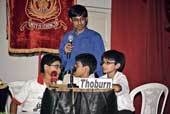 |
| AT THEIR FINGERTIPS: Students of Calcutta Boys’ School at the quiz competition, a part of the Lingua Fiesta. Picture by Anindya Shankar Ray |
School fest to hone language skills
Glamis thou art, and Cawdor, and shalt be/What thou art promised./ Yet do I fear thy nature/…..”
It did not take the students of Calcutta Boys School more than five seconds to come up with the next lines of Lady Macbeth’s speech in Shakespeare’s play: “It is too full o’ the milk of human kindness.”
The occasion was the inter-house quiz competition at the school, part of a three day Lingua Fiesta or language festival, held in May.
The festival, which kicked off in 2007, is an annual affair in the school calendar, testing the students in English, Hindi and Bengali. “We want to give students a platform to hone their language skills, while celebrating it as a festival,” said Raja McGee, the principal.
Apart from the quiz, other competitive events included debates, creative writing, elocution on poems by Rabindranath Tagore and Rabindrasangeet. The topics for the debates ranged from “our future lies in our hands’, the corrupting effects of the West on Indian ways to “Only the weak believe in God”. Speaking on the last subject, Class XI student Shushman Chowdhury said: “The importance of destiny is exaggerated and is an excuse for failure.”
The quiz questions ranged from explaining idioms like Draupadi ki kheer (something that never ends), to identifying the voice of TS Eliot reciting the lines from his poem, The Love Song of J. Alfred Prufrock. The other rounds included literature, la melange, language, audio-visual and rapid fire.
While Henderson house led in the first three rounds, the tables turned against them in the fourth round and Thoburn House walked away with the trophy.
Said Sunit Baheti, who cracked most of the Hindi language and literature answers: “In all these years, I have never participated in any of the school programmes, but this festival gave me an opportunity to go up to the stage and represent my house.”
Jhinuk Mazumdar
The prudence of being a philatelist
Do your eyes stray to the stamp on a letter before you take a look at the address? Then chances are that you are a philatelist.
A workshop organised by Starmark, in association with India Post, in the second week of May, attempted to introduce youngsters to the hobby of collecting stamps, the cost of which can begin from 10 paise for an ordinary stamp to Rs 10,000 for a rare one.
Conducted by Kalyan Nigel, a stamp dealer, it dealt with the do’s and don’ts of being a collector. Of the 30 participants, from 10 to 15 years of age, 20 were the winners of a letter-writing competition organised by India Post at South City mall in January.
Nigel began by asking students to preserve all stamps. “Though it may no longer be of use for sending mail, you might find out that it is valuable from the philatelist’s point of view,” he said.
The workshop also discussed ways of preserving stamps, so that they would be acceptable to enthusiasts. “If there are any perforations, folds or scratches, the stamp cannot be exhibited,” he said.
“Philately gives you an edge over your education. As you learn about what makes a stamp valuable, you learn about its background as well. You end up knowing a lot of history,” explained chief guest Harpreet Singh, the director of business mail, Calcutta GPO. Singh also arranges philately exhibitions at the district, state, national and international level for India Post.
India Post has philatelic bureaus in larger post offices in the city, where by opening an account for a minimum fee, the account-holder is supplied with any new commemorative stamp issued.
“Stamp collection requires considerable patience and is very useful for restless people. It makes them more careful in their activities,” said Nigel, who plans to conduct another workshop, depending on the response from this one.
Vinayak Kamal Ghosh definitely wants another one. The Class VI student of St Joseph’s College has already collected a few dozen stamps from the letters that his parents receive.
Sriyanta Chatterjee
 |
| Rabindranath Tagore. Today’s kids seem to relate more to his childhood days and hatred for regimented studies |
Bard and his bonds
- Kids find kinship with Tagore’s nature ties
Those who thought that the Net savvy, Barbie-infatuated kids of today would find Tagore outdated and alien were proved wrong at Shishu Kishore Akademi’s latest session on Tagore’s children’s poems, stories and plays. With escalating academic pressure and the harsh realities of urban living, children today relate more easily to the poet’s childhood. They find a kinship with his hatred for regimented studies and longing for the companionship of nature.
True to the Shishu Kishore tradition, the event at Bangla Akademi on May 25 had only children taking the dais to speak on their favourite piece by the bard. Since this was a competition with three prizes in each category of poetry, short stories and drama, the children were set a time limit of five minutes.
Avipsa Mukhopadhyay of Vivekananda Mission School, Joka, came first in the poetry section with a well-researched piece on the poem Matribatsal, drawing references to everything from Jesus, Ramakrishna to Bhisma, and talking knowledgeably about the parallels of the human mother and mother Nature.
Archi Roy of Santiniketan Patha Bhavan gave a more personal interpretation of the same poem, dwelling on the loneliness of children of working parents and the bonds of love that nevertheless bind them. She came second and Abhirupa Dutta of AG Church School, Asansol, came third, explaining the special place the poem Baul held for the child traumatised by the octopus-like urban civilisation.
Participants in the short story section were few and there seemed to be a preference for women-centric stories. Raya Chakraborty from Dum Dum Raktakarabi spoke of the deaf-mute Subha coming first, while Koel Ganguly of Sri Ramakrishna Sarada Sangha Balika Vidyalaya spoke on the literary longings of the homebound Uma in Tagore’s story Khata.
Since there was just one candidate for the drama section, Tanusree Chatterjee was given a special prize. Judges Ratna Mitra and Rajat Bandyopadhyay had several tips for competitors, including the bit of acting necessary to cover up the fact that you have mugged up your lines and using the language of everyday speech to make the delivery more believable and accessible.
Though these sessions spread literary awareness, the tense academic competitiveness runs the risk of defeating the purpose of these exercises in the long run.
Sebanti Sarkar
Chit chat
City debut
![]() The first Calcutta branch of Indian Institute of Planning and Management (IIPM) was inaugurated on June 1 by Tollywood star Prosenjit. Said Arindam Chaudhuri, the head of IIPM: “We had planned to come to the city long ago, but wanted to wait until we had reached the satisfactory standard.”
The first Calcutta branch of Indian Institute of Planning and Management (IIPM) was inaugurated on June 1 by Tollywood star Prosenjit. Said Arindam Chaudhuri, the head of IIPM: “We had planned to come to the city long ago, but wanted to wait until we had reached the satisfactory standard.”
IIPM also plans to set up institutes in Noida, Gurgaon, Chandigarh, Dehradun, Lucknow and Jaipur.
Green rally
![]() St. Xavier’s Institution, Panihati, celebrated World Environment Day on June 5 with a rally starting from the school campus to the foot bridge of Sodepur station and back. About a thousand students participated in it.
St. Xavier’s Institution, Panihati, celebrated World Environment Day on June 5 with a rally starting from the school campus to the foot bridge of Sodepur station and back. About a thousand students participated in it.
The issues, highlighted with tableaux and placards, were the harmful effects of smoking and chewing gutkha, excessive consumption of groundwater, killing of wildlife and loss of biodiversity and the benefits of planting trees.










